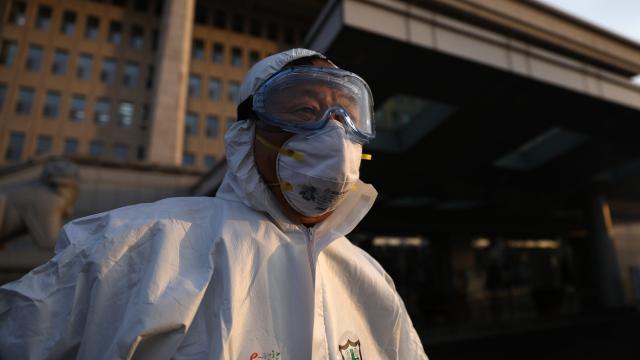A deadly new coronavirus is now clearly spreading across the globe—with hundreds of reported local cases surging in countries outside China, previously the sole epicentre of the outbreak. But for the time being, the World Health Organisation said on Monday that it will not declare the outbreak a pandemic, believing that such an announcement would be premature and only likely to further spread fear.
Over the weekend, several countries reported a startling jump in cases of COVID-19, the official name of the respiratory illness caused by the virus. In Italy, there are now over 200 cases; in South Korea, more than 800; and in Iran, at least 61 cases. Worldwide, there are now nearly 80,000 cases across more than two dozen countries, with at least 2,627 deaths.
Yet, these estimates are certainly only the tip of the iceberg and there are conflicting reports about the scale of some of these outbreaks. On Sunday, a local lawmaker in Iran disputed the government’s official tally, claiming there had been at least 50 deaths in the city of Qom; the country has so far only reported 12 deaths. (Iran’s government denies it’s underreporting the number of deaths from the disease.) That higher estimate, given the relatively low fatality rate (ranging from 2 per cent in China to less than 1 per cent elsewhere), could amount to hundreds of more undetected cases, if not thousands. Earlier in the weekend, an official with Iran’s health ministry stated that there could be cases in every major Iranian city.
In a press conference held Monday, WHO Director General Tedros Adhanom Ghebreyesus expressed concern about these clusters of COVID-19. But for several reasons, he stated that the WHO would not go as far as to declare it a pandemic level threat yet.
“For the moment, we are not witnessing the uncontained global spread of this coronavirus, and we are not witnessing large-scale severe disease or death,” he said. “What we see are epidemics in different parts of the world, affecting countries in different ways and requiring a tailored response.”
In China, Tedros said, the growth of new infections seems to have slowed down in recent days, while some other countries have been able to stop imported cases from spreading further—both good signs that would argue against the probability of this turning into a pandemic. At the same time, he added, countries have to do everything they can to prepare for its possibility.
“Using the word pandemic now does not fit the facts, but it may certainly cause fear…We do not live in a binary, black-and-white world,” he said. “We must focus on containment, while doing everything we can to prepare for a potential pandemic.”
At this point, it’s not clear how exactly when the WHO would go about changing its mind. On Monday, Reuters reported that the organisation had abandoned its old system of classification for a pandemic, which had been used previously for the 2009 H1N1 flu pandemic.
“For the sake of clarification, WHO does not use the old system of 6 phases,” a WHO representative told Gizmodo via email, while again stating the need for vigilance. “Definitions and terminology aside, our advice remains the same, and we continue working with countries to limit the spread of the virus while also preparing for the possibility of wider spread.”
